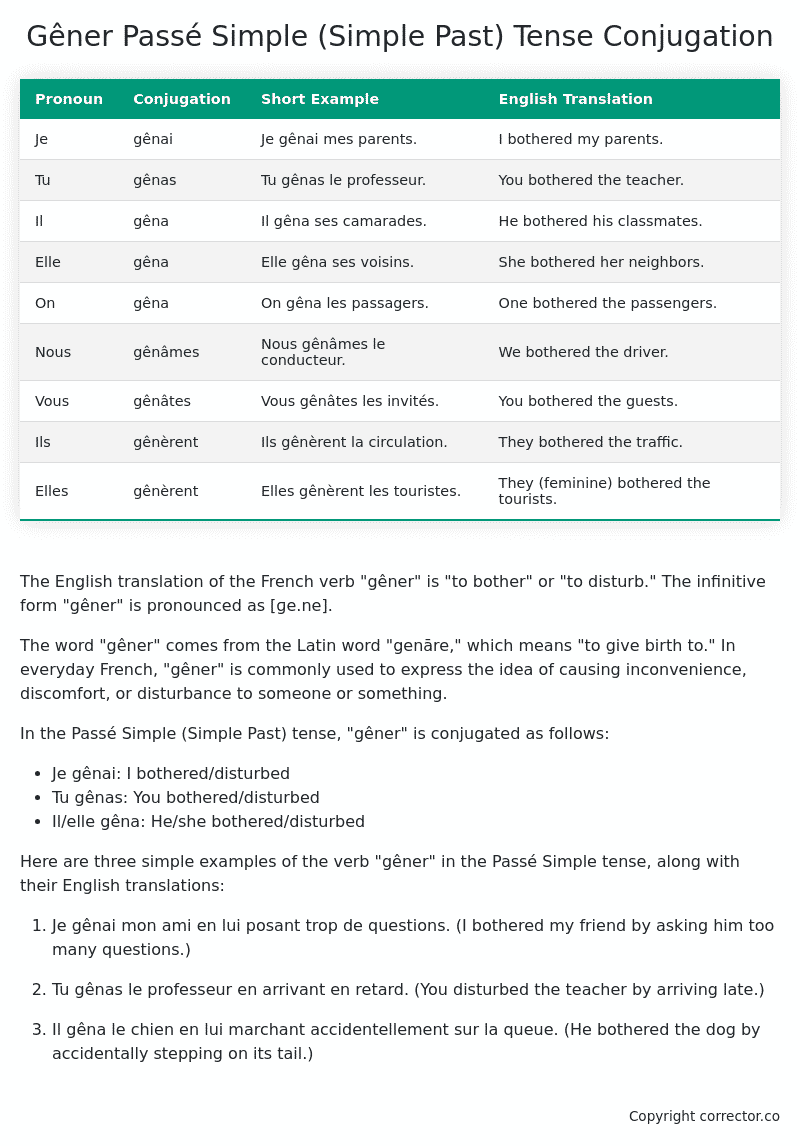Passé Simple (Simple Past) Tense Conjugation of the French Verb gêner
Introduction to the verb gêner
The English translation of the French verb “gêner” is “to bother” or “to disturb.” The infinitive form “gêner” is pronounced as [ɡe.ne].
The word “gêner” comes from the Latin word “genāre,” which means “to give birth to.” In everyday French, “gêner” is commonly used to express the idea of causing inconvenience, discomfort, or disturbance to someone or something.
In the Passé Simple (Simple Past) tense, “gêner” is conjugated as follows:
- Je gênai: I bothered/disturbed
- Tu gênas: You bothered/disturbed
- Il/elle gêna: He/she bothered/disturbed
Here are three simple examples of the verb “gêner” in the Passé Simple tense, along with their English translations:
-
Je gênai mon ami en lui posant trop de questions.
(I bothered my friend by asking him too many questions.) -
Tu gênas le professeur en arrivant en retard.
(You disturbed the teacher by arriving late.) -
Il gêna le chien en lui marchant accidentellement sur la queue.
(He bothered the dog by accidentally stepping on its tail.)
Table of the Passé Simple (Simple Past) Tense Conjugation of gêner
| Pronoun | Conjugation | Short Example | English Translation |
|---|---|---|---|
| Je | gênai | Je gênai mes parents. | I bothered my parents. |
| Tu | gênas | Tu gênas le professeur. | You bothered the teacher. |
| Il | gêna | Il gêna ses camarades. | He bothered his classmates. |
| Elle | gêna | Elle gêna ses voisins. | She bothered her neighbors. |
| On | gêna | On gêna les passagers. | One bothered the passengers. |
| Nous | gênâmes | Nous gênâmes le conducteur. | We bothered the driver. |
| Vous | gênâtes | Vous gênâtes les invités. | You bothered the guests. |
| Ils | gênèrent | Ils gênèrent la circulation. | They bothered the traffic. |
| Elles | gênèrent | Elles gênèrent les touristes. | They (feminine) bothered the tourists. |
Other Conjugations for Gêner.
Le Present (Present Tense) Conjugation of the French Verb gêner
Imparfait (Imperfect) Tense Conjugation of the French Verb gêner
Passé Simple (Simple Past) Tense Conjugation of the French Verb gêner (You’re reading it right now!)
Passé Composé (Present Perfect) Tense Conjugation of the French Verb gêner
Futur Simple (Simple Future) Tense Conjugation of the French Verb gêner
Futur Proche (Near Future) Tense Conjugation of the French Verb gêner
Plus-que-parfait (Pluperfect) Tense Conjugation of the French Verb gêner
Passé Antérieur (Past Anterior) Tense Conjugation of the French Verb gêner
Futur Antérieur (Future Anterior) Tense Conjugation of the French Verb gêner
Subjonctif Présent (Subjunctive Present) Tense Conjugation of the French Verb gêner
Subjonctif Passé (Subjunctive Past) Tense Conjugation of the French Verb gêner
Subjonctif Imparfait (Subjunctive Imperfect) Tense Conjugation of the French Verb gêner
Subjonctif Plus-que-parfait (Subjunctive Pluperfect) Tense Conjugation of the French Verb gêner
Conditionnel Présent (Conditional Present) Tense Conjugation of the French Verb gêner
Conditionnel Passé (Conditional Past) Tense Conjugation of the French Verb gêner
Conditionnel Passé II (Conditional Past II) Tense Conjugation of the French Verb gêner
L’impératif Présent (Imperative Present) Tense Conjugation of the French Verb gêner
L’impératif Passé (Imperative Past) Tense Conjugation of the French Verb gêner
L’infinitif Présent (Infinitive Present) Tense Conjugation of the French Verb gêner
L’infinitif Passé (Infinitive Past) Tense Conjugation of the French Verb gêner
Le Participe Présent (Present Participle) Tense Conjugation of the French Verb gêner
Le Participe Passé (Past Participle) Tense Conjugation of the French Verb gêner
Struggling with French verbs or the language in general? Why not use our free French Grammar Checker – no registration required!
Get a FREE Download Study Sheet of this Conjugation 🔥
Simply right click the image below, click “save image” and get your free reference for the gêner Passé Simple tense conjugation!

Gêner – About the French Passé Simple (Simple Past) Tense
Formation
Usage
Narration
Historical Context
Interactions with other tenses
Passé Composé
Imparfait
Conditional and Subjunctive
Summary
I hope you enjoyed this article on the verb gêner. Still in a learning mood? Check out another TOTALLY random French verb conjugation!


